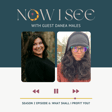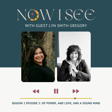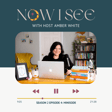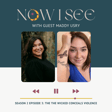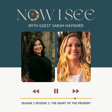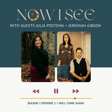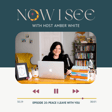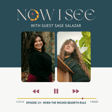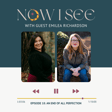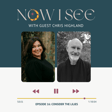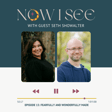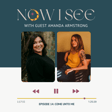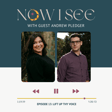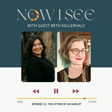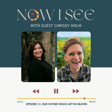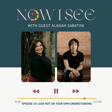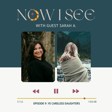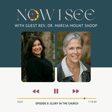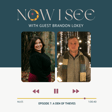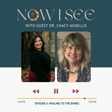Become a Creator today!Start creating today - Share your story with the world!
Start for free
00:00:00
00:00:01

Who Can Find a Virtuous Woman?: Rescuing Women’s Stories from the Bible with Ronna Detrick
When you think of women’s stories in the Bible, what do you think of? Is it empowering,? Or do you think of shame and blame? For many of us, it was the latter, and today’s guest is working to change that.
Ronna Detrick is a Spiritual Director and author of the Book Rewriting Eve: Rescuing Women’s Stories from the Bible and Claiming Them As Our Own. Together, we have a thoughtful conversation about her beautiful retelling of stories that have been often subjected to a negative patriarchal lens.
More From Ronna
- Visit Ronna’s Website
- Order Rewriting Eve
- Subscribe to Ronna’s Writing
- Follow Ronna on Facebook
- Follow Ronna on Instagram
Links
Transcript
Introduction to 'Now I See'
00:00:01
Speaker
I was lost in utter darkness I was trapped in toxic shame I was bound by my religion Till I chose to break away
00:00:24
Speaker
Now I'm finding my true colors For the first time I feel free Now I'm learning self compassion And as I heal I'm finding peace
00:00:51
Speaker
Welcome to Now I See, eye-opening stories from the formerly faithful. I'm your host, Amber White, and here, me and my guests share our experiences in loving and leaving rigid faith systems. Together, we shine a light on the dark corners of these institutions and share the joys of rebuilding life on our own terms. I promise you'll leave inspired, even if you are a little teary-eyed.
Interview with Ronna Dietrich on 'Rewriting Eve'
00:01:24
Speaker
Hi, and welcome back to Now I See. I'm your host, Amber White, and today's episode is a bit of a unique one because it's about Bible stories. I know, I was as surprised as you probably are right now. I'm talking with Ronna Dietrich, author of the book we're discussing today, rewriting Eve, rescuing women's stories from the Bible, and reclaiming them as our own.
00:01:52
Speaker
Hopefully the title helps you see why I'm willing to talk about Bible stories now. Rana is a certified spiritual director, and you'll see why in our conversation. She is insightful, vulnerable, and excited about spiritual autonomy for women. I found Rana while doing some work for another podcast, and I knew I was going to pre-order the book and ask her to be on this show.
00:02:20
Speaker
I am always deeply intrigued when I hear people taking the stories I learned in devastating ways and turning them on their heads to get a new perspective, which is often a fuller perspective, complete with historical and cultural context.
00:02:37
Speaker
Maybe it's the literature major in me, or maybe it's the little girl hearing stories about women and how dangerous, sinful, and terrible they are looking to heal. It's probably a little bit of both, but I can't look away from an opportunity to see these stories differently, even if I don't use scripture as a guide in my own life anymore. It's healing for me, and Ronna's book has been particularly good for those parts of me still a little wounded.
00:03:07
Speaker
I'm also very drawn to the idea of seeing these women as ever-living figures there to help guide us and inspire us.
Ronna's Personal Story of Empowerment
00:03:17
Speaker
Removing them from the context of the church, especially the complementarian church, gives them room to be more than yardsticks to measure myself against. I can look at these women now like I have any other literary figures in my life. And it's a gift.
00:03:37
Speaker
Ronna also has a remarkable story of wrestling with and eventually leaving the church and her marriage to a pastor.
00:03:46
Speaker
I'm glad y'all will get to hear a little bit about her journey and see just how awe-inspiring it is to be able to look at yourself with pride and gratitude for making your own decisions about how you want to live and believe. Your life is your own. And if you take nothing else from this podcast, I hope it's a strong belief that it is okay to do just that.
00:04:13
Speaker
You won't regret it. I may have regrets about some of the choices I've made, things I've said, and ways I've treated myself and others, but I've never once regretted taking charge of my spiritual life and deciding to see the world through a wider lens.
00:04:30
Speaker
whether you are reconciling with your faith or deconstructing from it. I hope you're doing it for yourself and your benefit. And I hope if this show has been a part of your journey, that you feel more capable and inspired than ever to honor yourself in that way.
00:04:48
Speaker
If you enjoy this conversation with Ronna, she has some great ways to connect with her work, which I have linked in the show notes for you. My guests also love hearing from you when you enjoy an episode, so please continue letting them know how much you connect with the work they're trying to do. Okay, let's get into some Bible stories this Sunday morning.
00:05:25
Speaker
Hi, Ronna. I am so happy to have you with me on the podcast today. I have been reading Rewriting Eve as a nightly ritual. I read a story and I get to reflect on it for a while before I go to sleep and it has been so
Reflections on 'Rewriting Eve'
00:05:40
Speaker
meaningful. I have been carrying it with me. It sits on my desk all day. I really have treated it like a meditation in my life and
00:05:48
Speaker
I was so excited when you said you wanted to be here and record with me. I think my listeners are going to really enjoy your story. So thank you for sharing.
00:05:58
Speaker
Thank you, Amber. I've heard from a couple of people, more than a couple, a number of people now, since the book's been out, that that is how they're experiencing it as something that they just kind of pick up for a little bit and then sit with, and then they set it back down, and then they pick it back up. So I didn't expect that, and I have loved that that's people's experience of it.
00:06:19
Speaker
How neat. I like that that's something that other people are feeling too, because I feel like you've created so many moments in this book for reflection and meditation from the letters that you're writing and the voice of these women or the meditation moments that you give us to reflect and think on, or even the stories that you're sharing of your own life as they relate to the lessons that you're taking from these stories. They're all very meditative. And so I kind of think it's neat that other people are experiencing that too.
00:06:49
Speaker
Yeah. Yeah, it does my heart good. Thank you. Yeah. So for the sake of our listeners, I would like to kind of tell them a little bit about your book. And so you've rewritten stories of women
00:07:04
Speaker
in the Bible, not always your main characters that we hear about all the time, which is something else I really love about this book. It's not Mary and Martha, it's Hagar who sometimes has been preached to me as a byline or the side character or the overlooked character in sermons. And I love that you've really given a voice to these women in a new way,
00:07:31
Speaker
And I'm wondering if you can share in your own words a little bit about what you've done here, what your purpose was, and how it feels now that it's created.
Feminist Reinterpretation of Bible Stories
00:07:41
Speaker
Sure, yeah, thank you. Well, I think for me, the writing of the book is really a reflection of my own journey, my own experience of knowing these stories like the back of my hand, having grown up in the church,
00:07:59
Speaker
not feeling like, I mean, it wouldn't even have crossed my mind decades ago to argue with the way that they were interpreted to think anything differently about them. But through the process of being in seminary, stepping into original languages of both Hebrew and Greek, studying feminist theology and womanist theology and liberation theology and
00:08:22
Speaker
beginning to understand how subjective the text is and how dependent it is upon the lens that you bring to it. I just started giving myself permission to wonder.
00:08:39
Speaker
what would happen if I tried to think about this story through the lens of the woman herself? Could I imagine what the story was like from her perspective? Could I imagine her voice? And I'm repeating myself a little bit, but this started for me at a really personal place.
00:09:02
Speaker
in that I was in a really difficult spot in my marriage, which eventually ended to the pastor. But my spiritual director at the time asked me, I kept saying, I feel like I'm in a desert. I'm just parched and weary and dry and there's no nourishment. There's nothing like I'm just looking at sands as far as I can see and
00:09:26
Speaker
nothing on the horizon. And she said to me, you know, Ronna, I know you were working with these stories of women, like who comes to your mind as it relates to women in the desert? And I said, Well, I can think of three of them immediately. And she said, All right, well, let's just pick one.
00:09:43
Speaker
let's pick Hagar." And I said, okay. And she said, I just wonder what you think Hagar would say to you in this desert that you're in, based on what you know of her story, based on what you know she experienced, based on your affinity for her. What do you think she would say? And that really started, again, at a very personal and experiential level, this whole thing of me imagining Hagar's
00:10:11
Speaker
voice on my behalf, her presence in my life, seeing her as a companion and a friend and a mentor and a guide. And that just started the ball rolling. Then I thought, Oh, well, I could do this with more, maybe I should just do this. And so I have been for about 20 years, this is what I've been doing is working with these stories and trying to imagine them in a different way and attaching
00:10:38
Speaker
the relevance that I believe their stories offer to the realities of my life and the lives of women that I see around me. And finally, have
Questioning Beliefs in Seminary
00:10:49
Speaker
written all down in a book. Well, not all of them, but I chose 10 and added those and put them into book form. So lovely to have the world and moved beyond me into other people's hands like yours.
00:11:02
Speaker
Yeah, well, that is remarkable that you spent 20 years doing this. And what a gift to have a mentor, a spiritual mentor in your life to help you think of these stories in a new way. It wasn't until almost a decade after I left fundamentalism that I first heard the story of the woman at the well in a cultural context.
00:11:26
Speaker
that was historically accurate, right? So until... I'm sorry. I know, me too, because it's an amazing story, right? You know, it's a wonderful story of Jesus seeing her for the harm that had been done in her life because of structures that were beyond her control and rules and regulations that were beyond her control and
00:11:49
Speaker
seeing beyond those into the heart of a person who is deeply hurt by these is very different than saying, he saw her for being such a whore, which is how I was taught it. Yeah, and it's more, gosh, it's just so much more beautiful to think of someone who can see you for all of your humanity and for all of the struggles that come with being a human being, especially a woman in a patriarchal,
00:12:19
Speaker
Yeah. And not just Jesus seeing, like I think that's hugely significant in that story the way that he sees her. But I think the other thing that I point to in that story is that when we think about how we've heard it,
00:12:34
Speaker
What we've incorporated, what we've come to understand is someone else's seeing of that story, of that woman, not the story itself. There's nothing in that story that would lead us to think that she's a whore. There's no mention of shame anywhere in that story.
00:12:52
Speaker
We're the ones we in a very large generalization who have applied that to her story who have created a lesson out of that don't be like her we've extrapolated Jesus answers or the questions that Jesus asks of her to somehow be.
00:13:11
Speaker
trying to get her to finally confess her sins. And I just don't think any of that was what was going on in that story. And that's a good example, I think, of allowing, giving ourselves permission to go back into this text
00:13:31
Speaker
and honor these stories of women as stand-alones, not as lessons of shame or how not to be, which is usually how these stories have been twisted around, and instead to say, well, what if I honored them?
00:13:49
Speaker
What if I peeled back the doctrine and the dogma and I just looked at the woman for who she is and listened to that story that might be radically different and that might just change everything. And it really does change everything about how these stories can be looked at and can be learned from and can be
00:14:15
Speaker
sources of healing instead of sources of hurt. And while I don't personally look to the Bible as an infallible authority on God or my own life, I grew up on it. And so these are the stories. This is the way I learned about women. This is the way I learned about how God thinks about women and how men think about women, right? So it has been... Well, and the two were completely the same.
00:14:45
Speaker
Right, exactly. What difference is there? There was no difference for you and probably not for most of us. No, exactly, exactly right. And it has been such a healing experience for me that even though I don't necessarily believe that all of this is
00:15:04
Speaker
infallible and literal. It is still immensely healing to go back and look at these stories and the way I learned about women in a different way and see just how wonderful womanhood is and how beautiful it can be and how precious it is instead of how dangerous it is.
00:15:27
Speaker
and how painful it is and how terrible women are all the time and that's why they need to be subjugated and you know it's been, it's a healing experience I didn't expect and I have just really appreciated the perspective of women even as overlooked as the Canaanite woman who doesn't even get a name. Right. The way that you were able. Neither does the woman at the well, right? Right, yeah.
00:15:52
Speaker
I think the three stories from the New Testament that I used, none of them have names, which I find fascinating and disturbing all at once. Isn't it? Because I mean, even Zacchaeus got a name.
00:16:04
Speaker
And he was just a wee little man. So says the song. So says the song. I will never forget that song as long as I know. I wish you hadn't brought it up because now it's going to stick in my head. Me too. My poor partner. He's going to be exhausted. One of the things I hear you saying here, Amber, and this is one of the things I really wrestled with in the writing of the book is that
00:16:32
Speaker
I'm looking at stories of women in the Bible, but not because they're in the Bible. That's not the premise or the thing that I'm trying to somehow sustain or honor or
00:16:48
Speaker
save somehow like that's I don't care about that. They that is where the stories have to are found. So there's nothing I can do about the reality that this is the text in which they dwell. But what I can do is look at them as distinct individuals in a particular point in time, no different than I would look at Harriet Tubman, or Sojourner Truth, or
00:17:20
Speaker
We can look at any story of a woman historically outside the context of Scripture, and we don't apply the same rigor, nor do we apply the same judgment.
00:17:32
Speaker
So true. And I think, well, why? Like, why can't I go back to the story of the woman at the well and look at her as part of my matrilineal line, as part of my ancestral line, as a source of wisdom and presence
Deconstructing Religious Beliefs
00:17:49
Speaker
and power for me?
00:17:51
Speaker
versus all of the yich that has been attached to these stories for so much of their lives. But I do think for people that find the book or that hear about the book, that's a bind, right? Like, oh, they're Bible stories. Right. And I'm like, well, yeah, because that's where they are. But let's pull them out of that.
00:18:14
Speaker
so that they can be honored and seen and understood so that we get the benefit of these stories instead of being sucked into the vortex of all the things we've worked so hard to leave. Right. Right. And it reminds me of the subtitle of the book, which is rescuing women's stories from the Bible and reclaiming them as our own.
00:18:33
Speaker
What a beautiful purpose to say, you don't get to have this anymore. These are ours. And we can have them as moments of encouragement in our life and of, like you said, that matriline, that lineage. And I like how you end it with, you know, my daughter, my lineage, my kin at the end of these letters. It's just such a beautiful connecting moment. And that leads me to ask what your experience is
00:18:59
Speaker
you know, what led you to wanting to do this? What is your experience in the faith? And what led you to leave it?
00:19:08
Speaker
Simple questions here. Yeah, how much time? Let's see. So I grew up in the church, not as scary as your experience in fundamentalist Baptist church. I grew up in the Presbyterian church, which is relatively liberal in the scheme of things, at least by sake of comparison, but grew up in a very traditional
00:19:32
Speaker
devout, practicing Christian family. I mean, we were in church every single Sunday. Most of the friends that my parents had were from the church. I went to vacation Bible school. I played the piano. I sang in the choir. I did all the things that anybody does who lives their lives in this social construct.
00:19:55
Speaker
I went to a Christian college when I graduated from high school. And I think really for many of us, it's when we go to college and we don't have to go to church because we're not living with our parents anymore, then we begin to experiment and we begin to wonder, what do I really believe? What do I want to do? What do I think?
00:20:15
Speaker
compared to what I've been, you know, birthed into. And so that was certainly my experience in college, but again, in a very contained Christian environment. So it wasn't wildly, you know, it wasn't a wild, you know, it wasn't, yeah, it was, it was all very safe. Anyhow, if I fast forward, you know, I went through my 20s, really going back and forth and back and forth between
00:20:44
Speaker
The guilt i felt over not living my life the way that i thought that i should as a christian woman and the part of me that thought i don't like that i feel this way i don't like like i don't know how to reconcile these things.
00:20:59
Speaker
And so at one point in time, I just felt like I need to kind of do a control alt delete here. I've got to change the way that I'm everything. So what do I do? I join a missionary organization and I moved to Korea. And that was it was an amazing experience and it was
00:21:26
Speaker
Really hard and it was Yeah, it was I mean I could talk for a long time about that while I was there I met my then to become husband who was a chaplain in the army Then I became a pastor's wife
00:21:41
Speaker
And he retired and we took a church. And so now I'm deep in it again. I had two daughters after many years of infertility. I had two girls. Now I'm a pastor's wife with two little girls that I'm raising in the context of the church. And then at the age of 40, I guess it was 39, 40, I decided to go to seminary.
00:22:09
Speaker
Not because I wanted to be a pastor. One in our house was more than enough. But because the school that I chose was very progressive, really liberal, and really trying to think about the relevance of spirituality in culture. And I looked at the reading list and was completely seduced. I'm like,
00:22:33
Speaker
Oh my gosh, like if I get to read books like this and write about this kind of stuff, sign me up. That sounds awesome. And so Seminary was a really good experience for me. And it really was the place where I started deconstructing all of the things that I had just taken in and believed because there was no reason to not. Like when this is the world that you live in, you don't think necessarily
00:22:58
Speaker
to disagree or it doesn't feel dissonant because everything supports it. But in seminary, even though I'm still married to the pastor, being a pastor's wife, teaching Bible studies, doing all those things, the things that I was reading and the things that I was studying was really giving me the space to start to pick and choose what I wanted to hold on to, what I was no longer willing to hold on to,
00:23:29
Speaker
And in the midst of that, it really started to create that my questioning and my growth and my change caused lots of disruption in the context of our marriage. And I think the problems had been there before, but now I could see them in a new way. Now I could talk about them in a different way. One thing led to another. And shortly after I graduated with my master divinity degree, we divorced.
00:23:57
Speaker
And I've not gone to church since then. I might have gone two or three times just to try it, but I've not gone back. And I knew in leaving the marriage that I clearly wasn't going back to that church because he was still there working. My daughters continued to go there for a while before they stopped as well. But anyway, this is a long rambling story to say that it's
00:24:26
Speaker
I think most of us that grow up in a Christian world have a Christian worldview, and it's rarely rattled until it is. And then once it is, you can't unsee what you've seen. It's very difficult to settle that dissonance once you've begun to see and understand other things.
00:24:52
Speaker
It was in seminary where I started thinking about these women's stories in a totally different way.
00:24:57
Speaker
where I started recognizing how subjective the text was, where I started realizing that I didn't have to believe in atonement if I didn't want to. I didn't have to believe in predestination if I didn't want to. Like, oh, there's other ideas. There's other ways of thinking about this. There are other people who have written about this in a different way. I like that better. And so in lots of ways, it sort of felt like a house of cards, like the second thing
00:25:27
Speaker
flick one of them, it all starts to wobble and fall down. And that made me so happy. Like, not in a malicious way, but once I could see it falling, there was something in me that went, oh, maybe it's not as strong as I thought it was. Maybe I have more freedom to walk away,
00:25:57
Speaker
reframe how I view myself in the world, what I believe in, whether I want to believe anything or not, what I deem sacred, how I feel about myself. It just opened up this huge space for me that unlike many people that I've talked to, it wasn't
00:26:17
Speaker
It wasn't scary or daunting, it just felt like a breath of fresh air. Leaving the marriage was scary and daunting because I was still in the thick of it at that time and that felt like the wrong choice and that surely God would want my marriage to stay intact and surely I needed to do everything I possibly could to keep it together.
00:26:39
Speaker
Surely, I had a girlfriend once who said, if we ever write a book, we're going to name it, God's name is Shirley. Because this is how you talk, right? Like we say, surely God would want my marriage to survive. Surely God would want me to try harder. Surely God would want me to be obedient and faithful. Surely God's going to make this work, right? And when I finally got to the place where I went, oh, maybe that isn't what God does.
00:27:09
Speaker
maybe I've got this all wrong, then I could start to make some different decisions. So anyway, I'm not even sure I answered the actual question you asked me, but yeah, it's an ongoing journey, isn't it? It is. I've been out of the church now for, I don't know, almost 20 years.
00:27:33
Speaker
I don't think about it all that often other than the fact that I talk about it in this context. I don't miss it other than every once in a while like liturgy or hymns or ritual. There are moments where I go to a wedding or a baptism or something like that and there's a kind of a sentimental part of me that
00:27:57
Speaker
can honor the beauty and the history and the tradition. But for the most part, it feels like something that shaped me profoundly and that I've been able to look at long enough, well enough, objectively enough, and with enough grace to be able to say thank you and now let's do something new.
00:28:24
Speaker
I love that. You most definitely answered my question in a beautiful way. I love it. And I love the House of Cards analogy because I remember the moment that I decided, this is it, I'm not doing this version of Christianity anymore. So I went from kind of strict to maybe I just want a softer version of this. That moment really, that one piece of theology that didn't fit anymore, all of a sudden there's like,
00:28:52
Speaker
the apple carts turned over and there's all these apples rolling down the hill and you're just chasing all these different apples going, can I get you back in the cart? And you realize, no, they're too far gone now. They're just rolling away. That's how I felt when I began working with Eve's story in lots of ways because I thought, oh, wait a second. If I change
00:29:14
Speaker
the way she's understood for myself, not to mention what I hope I am offering others. But if I change that for me, everything hinges on how we've interpreted that singular story. That's a house of cards right there. If I change that story, I can start to see the snowball rolling down the hill. That's going to bump into this, which is going to bump into this, which is going to bump into this.
00:29:39
Speaker
And I sat there up at the top of the hill for a little bit going, hmm, do I want to push that snowball down the hill? Because it's going to be an avalanche. I can see exactly what's going to happen if I do this. But again, I think that when we see it even in advance,
00:30:01
Speaker
it's data.
Fear and Courage in Personal Growth
00:30:02
Speaker
It's like, oh, this is all being held together with duct tape. These theological tenets that we think are inviolable truth
00:30:18
Speaker
Oh, they're not that. Oh, they have movement and give like this is wobbly, which doesn't mean it all needs to break apart necessarily. But it does mean that there is so much more room for us in all of it than we were led to believe.
00:30:39
Speaker
Yeah, absolutely. There's a creator that I really like named Dan McClellan, and he has a podcast called Data Over Dogma. And he does a lot of videos that he's trying to help slow the spread of misinformation about what scripture is actually saying, because there are a lot of folks still holding to some of the things that are hurtful to our trans communities, our queer communities, our people of color. And he just does a great job of really breaking it down. And he
00:31:08
Speaker
made this comment that really changed the way that I think about biblical text and he says that
00:31:18
Speaker
what we believe about the text is a negotiation. Churches are always negotiating, religious bodies are always negotiating with what the text is and then deciding when the negotiation is over and what it's going to be. And that changes over time. The fact that I went to a church that was as conservative as it was, but women didn't wear head coverings was a negotiation.
00:31:41
Speaker
That is a negotiation with the text that they agreed upon and decided. And when you start looking at the scripture and then the churches that are holding to different parts of it as just that, they've decided that's what this text means. This is a negotiation they had that I was not a part of.
00:31:59
Speaker
and didn't get to negotiate for myself. It really changed the way that I think about that. And I think you've done a really incredible negotiation with the text on your own terms. And I think that's something we all get to do because I think we're all given different personalities and different perspectives, different ways of seeing the world. Why would it not be a beautiful thing to negotiate individually with this text? Yeah.
00:32:29
Speaker
I think that's really cool. And I think you really grabbed the bull by the horns with that and ran with it and said, I can do that. And I love that you did. It's a beautiful piece of work that I will carry with me for the rest of my life. And I can't really overstate the impact this book has had on me. And I didn't expect it. I did not expect to have this kind of a healing moment going back to scripture.
00:32:54
Speaker
but it has been just that. And I can't imagine that you putting out this book and making the decisions that you've made has not been without consequence. Yeah, no question. Yeah. Yeah. I mean, again, I've been working on it for so long. Again, not thinking initially 20 years ago that I was going to write a book, but in terms of stepping into these stories and really
00:33:20
Speaker
letting them impact me like being in relationship with these women in a much different way changed who I was as a woman for sure. And I think
00:33:36
Speaker
I wouldn't say that my theology or lack thereof, that a consequence of that was the demise of my marriage. I think that was my marriage. I don't think it was theological or that it was around our varying beliefs. It was really between the two of us and what was going on between the two of us in our own lives and stories and pathologies and patterns and behaviors and all those kinds of things.
00:34:05
Speaker
And because I had already left the church and religion by the time I was really actively writing and giving my TED talk and
00:34:17
Speaker
presenting on these ideas. I wasn't feeling some kind of a disconnect from a community because I had already left it at that point in time. I think the place that now I can look at it with more generosity probably than I have been able to at points in the writing process
00:34:42
Speaker
is that I felt for a long time like I was going to have to argue my point. Like I was really clear on how I felt, what I believed, what I wanted to be able to say and I still am. I'm very
00:34:58
Speaker
committed to being right about this and again not that someone else is wrong necessarily but I really passionately believe in what it is that I have written and what I'm trying to communicate and say and offer to women and men but to women specifically. That said I spent years not writing the book or being stuck in the writing of the book
00:35:20
Speaker
because I felt like I had to somehow be able to prove that I had the right to say what I wanted to say. That I had the right and the education and the certification and the background and all kinds of things to be able to accurate, it's like apologetics, to be able to argue my position. Right.
00:35:45
Speaker
I don't, I wish I knew what it was that started to change that or what did change that, but it really wasn't until I completely let go of that and said, you know what? I'm just, I'm just not going to argue about this. Like this is what I believe. This is what I feel. This is what I want to be able to say.
00:36:02
Speaker
And I'm just not going to have conversations with people that want to argue with me because I don't need to. Like I'm not going to win. Like there's no winning in those kinds of discussions. So what I would say is when you're asking me about the consequences, I think the consequence of growing up in a shame based strive for perfection in all things be
00:36:27
Speaker
subservient and I'm being horribly derogatory. My life was not like I was living in Amish country or something. But still, that was so ingrained in me to not make waves, to not upset the apple cart, to be demure, to pull back, to not
00:36:50
Speaker
exert my opinion or my voice, especially if it was controversial. All of that, those consequences took me
00:37:01
Speaker
years and years and years to get past, to be able to finally write the book, say what I want to say, be clear that I'm not going to argue about it. And I would say there have probably been consequences that I don't know of yet.
00:37:20
Speaker
people that have known me for a long time that will read the book and go, oh, yeah, we need to pray for her. But I don't know that that's going to be a huge consequence for me. I'm not all that worried about them.
00:37:37
Speaker
Yeah. And I think, I mean, now I'm rambling a little bit, Amber, but what I will say is that I think for women specifically, I talk about this in other contexts and probably in the book, like we are so conditioned to weigh every single risk, every single cost, every single consequence of us following our own desire, trusting our own heart, believing in our inner wisdom. We are so conditioned to not trust
00:38:07
Speaker
to look to others for answers and for authority and for acceptance, that this idea of trusting ourselves, of speaking what we actually think and feel,
00:38:23
Speaker
It's, you know, we're, we're certain all hell's going to break loose when we do that.
Consequences of Trusting Women's Wisdom
00:38:29
Speaker
And sometimes it does. But those are the consequences that I think we are faced with as women when we retell these stories, when we see ourselves and women as sources of power.
00:38:43
Speaker
authority, truth, integrity, that we can trust ourselves. There are all kinds of consequences when we do that. There really are. That has little to do with the theology. That's just gotten messed up in the middle of it. But those consequences, I mean, I've often said to clients and to others, like for me,
00:39:10
Speaker
The second that I can name the consequences, I already know what my decision has to be. I already know. Like, okay, so that's what they're going to be. All right. There's no discernment that needs to be done here. It's clear. If there were no consequences, there's nothing I need to decide.
00:39:27
Speaker
But yeah, then what's the point? It's probably not upsetting anything. I had this exact conversation in therapy before I started this podcast, which is, so I'm having this beautiful moment right now. Yeah. Like, you know, if I do this, who am I going to upset? And it turns out a lot of people, a lot of people, I am, I am dinner table conversation these days. And, you know,
00:39:54
Speaker
My therapist said to me, it's only a consequence if it bothers you. And that was the liberation that I needed to just be like, you know what? It doesn't really bother me that much because this matters to me so much more than that approval matters to me. And certainly there were consequences to this that I didn't expect and that took me by surprise when I've had to work through.
00:40:20
Speaker
Of course. You said something in the book that has stuck with me and I have it highlighted. I have it flagged. I go back to it. You said our fear and courage coexist when we choose to speak up in our own home. And when I think of own home for me, I think of in my arena, right? In my life, in my world. And you said, especially when it disrupts the status quo. That's where the change happens.
00:40:49
Speaker
without the consequences. What are you upsetting? What are you changing? What are you shedding light on that's hiding in some little corner somewhere that needs that light shown on it to take care of it? And I just really felt that moment. I also like just soon after that, you quote another woman who says, a life lived in fear is a life half lived. And those two, yeah.
00:41:16
Speaker
I've got to watch that movie now. Now I'm obsessed with the idea that I've never seen. Yeah, it's my very favorite movie. Yeah. I'm going to watch it this weekend. That's going to be my reward for editing. But I just thought those two go so hand in hand with together. They're great quotes side by side, but just in
00:41:36
Speaker
the story of you and you doing this and then it felt so much like me and the story of my doing this and then all the wonderful people I've met doing this podcast who are out there trying so hard to do this work to say maybe there's a better way than this way that we've been doing things that's hurting people and that hurt me and that is maybe not the end all be all.
00:42:02
Speaker
Yeah, I think you know, Amber, like we're so afraid of being afraid.
Fear as Valuable Data
00:42:06
Speaker
We see fear or we see risk as this warning sign. Like don't go that way. Don't do that. Like that's too dangerous. That's going to cause problems. And I feel like when fear shows up,
00:42:21
Speaker
I should welcome it. Oh, that's data for me. Oh, that's information because now that's different if I'm walking down a dark alley. Like that's information too. Like I need that information.
00:42:36
Speaker
but in my personal life in my own experiences like if i feel afraid to say what i think if i feel afraid to express my opinion if i feel afraid that if i make this choice you know my whole world is going to start to crumble
00:42:53
Speaker
Wow, okay, I want to look at that. I want to be able to look at fear, risk, consequences, all those things as beautiful forms of discernment that begin to invite me
00:43:09
Speaker
into a life that isn't without fear like i would expect that that will continue to be there but that i can welcome it instead of pushing it away trying to come up with a way of living my life that i never feel afraid that i never upset the apple cart no one's ever upset with me that everything's always perfect i think that's like.
00:43:28
Speaker
anti-biblical, if I were to go that far. Everything in the Bible is messed up, upside down, confusing, disruptive. It's not kumbaya at all. And so I just think it takes a lot of retraining for us as women, particularly, to begin to see these things or to appreciate these emotions and feelings that we have as markers of our wisdom.
00:43:57
Speaker
How do I trust the wisdom that's mine that shows up in my fear, that shows up in consequences? What is that telling me? What is it inviting? I love that. I'm in a fear moment right now with a big turning point in my life and I was thinking about it this morning and now I feel like I have some words of wisdom. Now I feel like I can explore the fear. I love that idea because it really is just information, right? That's what feelings are. They're information, good and bad feelings.
00:44:26
Speaker
Yes. I think that's really lovely. So I'm curious, as I'm reading through your book and I'm reading each of these stories, I'm wondering if you have a personal favorite or one that seems to come up for you more often than others. Is it hard to choose a favorite? Do you have a favorite? It is hard to choose a favorite. It's sort of like choosing your favorite child, right? It's like completely impossible. Yeah.
00:44:57
Speaker
I mean, the one I always go back to as my kind of touchstone is the story of Hagar because it really was where I
00:45:10
Speaker
had such a deeply personal experience of experimenting, of inviting and being curious about what might happen if I actually trusted her. And honestly, Amber, I could pick any of them and many others that aren't in the book, depending on what I'm struggling with on a given day or what I'm thinking about on behalf of the people I care about.
00:45:40
Speaker
So you should tell me which one your favorite is and then I can talk about that one. Hagar. I'm glad you mentioned her. Well, I think I just had such an incredible experience reading your take and reading what you said about her because I had never thought about or been taught that Hagar is the only person or the first person to see God. Exactly.
00:46:08
Speaker
That's incredible. Isn't that shocking? Shocking. I mean, I figured, I mean, not because I'm so brilliant, but like, so I don't mean it this way, but like when I stumbled across this, when I figured it out, like I didn't read it somewhere. Like I just was in the text, I was looking at the text, I was paying attention to what was going on. And I thought, is there another time where the divine has shown up before this? And of course, the automatic answer we usually go to is, well, in the garden.
00:46:37
Speaker
in Genesis 1 through 3. So I go back to Genesis 1 through 3 and I'm like, you know what? We hear that God was walking in the garden in the cool of the day, but there's no text that tells us that God was seen. Like we assume that, but the text doesn't tell us that. Then the next answer people would say would be, well, Abraham, God showed up for Abraham. I'm like, mm-mm, God spoke to Abraham.
00:47:03
Speaker
didn't show up. There was no theophany, which is what that term is when there's a visible manifestation of the divine.
Challenging Traditional Interpretations of God
00:47:11
Speaker
So when I realized that Hagar was the first person to whom the divine showed up, and not just the first person, but a woman, and not just any woman, a marginalized woman,
00:47:28
Speaker
without resource, without support, who's been harmed, who's been abused, who's been mistreated, who has nothing of her own. That's who the divine shows up for first? Oh, well, if you'd told me that a long time ago, that would have radically shaped my understanding of how God shows up for me, of who God sees
00:47:58
Speaker
first, foremost, as priority. That's not what we've been told. No. Now, I could probably go down a conspiracy theory route and tell you why I think that story hasn't been told that way, and then I would probably be relatively accurate in that regard. But once I kind of landed on it, then I did start looking. Then I'm like, who else knows this? I can't be the only person
00:48:24
Speaker
Who knows this? And so I start researching. I'm looking at, you know, I'm going looking at my bookshelves of all my books from seminary. I mean, this was a long time ago, but like I'm digging. I'm researching scholarly articles. I'm trying to find anything I can find that validates that what I think I just found is true. And I did find a few mentions of this, but very few.
00:48:53
Speaker
And all by women, all by feminist theologians. Of course. Isn't that shocking? It still shocks me. So shocking. It is shocking. Not that it happened. That part, as soon as I landed on it, I'm like, of course. Of course. Of course. That's who the divine shows up for first. A woman. Of course.
00:49:19
Speaker
But what was shocking is that we'd not been told this. Yeah, that hadn't that that wasn't the way we told that story. I just was I still it's mind boggling to me. I mean, it isn't because I'm cynical enough to understand exactly why the story hasn't been told that way. But still, that's astonishing to me that we have not honored and celebrated and acknowledged God's heart as seen in her story.
00:49:49
Speaker
Yes, and I think not even just that she is the only one to see, she named God. Yeah, first naming, yes. Named God. I mean, up until this point, we've seen God give Adam and Eve, potentially maybe just Adam, the responsibility for caring for and naming
00:50:11
Speaker
And then all of a sudden, we have a woman who's then turning that around and naming God themself. Yes. That is remarkable. That is powerful. That changes everything about, everything I've ever learned. And I will say, I mean, it changes everything when we recognize both who Hagar was in that moment and who the divine is in relation with her.
00:50:37
Speaker
It also changes everything when we recognize that that story somehow survived that way in the text. I mean, honestly, if I were still to believe in a God the way that I once did, this would be the evidence for me that a God actually exists because these women in this text somehow have survived. All the scribes, all the translations, all the misogyny,
00:51:07
Speaker
all the patriarchy, all the centuries, somehow that story was told and written down and transcribed that way. What?
00:51:22
Speaker
It's amazing, truly. And there's a third piece to this that also I go back to all the time, and it's that she got the same promise that Abraham did, the same promise. And you read it and you're like, oh, that's so simple. Yeah, it's the same promise. But in the way that I was taught it,
00:51:46
Speaker
It was very much like, oh, Abraham's great promise. Oh, Hagar, cool. That's fine. In the background, it's the same promise from God that she would have generations and generations of people past her to carry on. That's incredible. That is an honor.
00:52:05
Speaker
that we only hear in churches like mine being given to men. And here it is being given to a servant of what's considered a great man of God.
00:52:18
Speaker
who had been wronged by this family that was supposed to be God's lineage, like His chosen lineage, and she's getting the same thing. But no, let's not talk about her. And I just, it reminds me of the scripture that says God makes it to reign on the just and the unjust. To me, that's such a call back to that story of like these promises are going out to both of them.
00:52:45
Speaker
not because one or the other is special or better or different, but because they are. They just are. And there's really no way to control or understand that, but they're both worthy.
Reimagining the Divine
00:53:01
Speaker
Yeah, I think it just speaks to an understanding of the Divine that is generous and kind and longing on behalf of us. Not that we be better, not that we be more faithful, more perfect, less sinful.
00:53:25
Speaker
but that longs to give, that wants to be generous. And I think when I then begin to translate that into a broader and much more liberal understanding of the divine, of spirituality, of the sacred, that really is helpful for me to start to see generosity and grace and kindness
00:53:52
Speaker
and love as the default nature of anything we might call the divine. I have stories and data that have been trying to tell us that all along. It's just that the stories that have gotten the most airtime have been the God of judgment and the God who discerns between good and bad, right and wrong. Hope you're lucky enough to be one of the chosen ones, all that.
00:54:21
Speaker
Yeah, bullshit. And the God of men, you know, just the God of men and men only. Yes, yes. Yeah. One of the things I say a lot on this show is that I really dislike the gendering of the divine because I think it cuts off half a population of people from seeing themselves as divine in the divine and loved by the divine. Absolutely. And I think it's a travesty that we have assigned
00:54:49
Speaker
gender to God. And I just love that we're flipping that script now, we're talking about it. These conversations like you and I are having, it's changing that narrative if only for the people that we connect with and the people that we know.
00:55:05
Speaker
And that's a beautiful thing. It's wonderful. And I'm so grateful for it. And I'm so grateful that you decided to exercise that courage in your own life and give us this book.
Where to Find 'Rewriting Eve'
00:55:20
Speaker
It's a really wonderful thing. And where all might folks go to be able to purchase it?
00:55:26
Speaker
You can get it anywhere you buy books online. You can go to bookshop.org, which is what I always ask people to do because it's in support of independent booksellers. But you can certainly go to Amazon, Barnes and Noble. I found it online at both Walmart and Target. So it's anywhere online. And if you have a bookstore, you can ask them to order it, which I would love if you ask the bookstore to bring it in directly. So yeah, it's everywhere.
00:55:54
Speaker
For our listeners, I will have this book linked in my bookshop for the podcast so you can support independent booksellers that way. But I am also a huge fan of going to the local bookstore and asking, it's an experience and I love the local bookstore. And then are you also doing an audio version of the book?
00:56:12
Speaker
I am, I've recorded the audio version. I did that a few weeks back, which was very fun. And it should be out hopefully by the end of November is what they're telling me is that it will be produced and edited and available. So I'm super excited to be able to make that available to people and honored to be the one who got to read my own work. Yeah, that's really special. I'm glad you got to do that as well.
00:56:38
Speaker
And the book isn't the only way to connect with you. You have several other ways that people can get to know you or work with you. Sure. And would you share a little bit of that with us? Yeah. Well, for sure you can follow me on social. I'm on both Facebook and Instagram just under my name, Ronna Dietrich. And I write, I still am writing, even though the book's done, I write all the time and I do that on Substack.
00:56:59
Speaker
So again, just Rana Dietrich at Substack and I would love for people to subscribe and be able to, you know, be part of that community and be receiving what it is that I am continuing to put out into the world. And then I have a website, Rana Dietrich.com, which talks about other things that I offer and the social spiritual direction that I offer and the coaching that I do and lots of other things that are part of my business and work in the world.
00:57:27
Speaker
Are you still doing these character readings? Oh, the sacred readings? The sacred readings, yes. Yeah, I've been doing those for, gosh, I think this year will be maybe
00:57:40
Speaker
15. I have to go back and look, but just to explain to your listeners, I have a deck of cards that used to be on index cards, but now that's an actual deck that you can buy from me. That's 52 of these women from scripture and wisdom that I've honed down into three statements on each card from each of these women.
00:58:03
Speaker
So when you purchase a sacred reading from me, I shuffle the deck and hold you and your heart in my mind and draw a card, trusting that whichever woman shows up has exactly the story and wisdom and perspective that will be meaningful for you. And so then I craft a reading, which is usually 10, 12, 15 pages of
00:58:30
Speaker
her story, the primary things that I would want you to know about that story and the ways in which I would anticipate you could apply the wisdom that she offers you. There's a blessing similar to what you see at the end of each of the chapters that I've written in her voice. There are journal questions and reflection questions and all kinds of stuff that's part of that.
00:58:52
Speaker
And I have women who've purchased one, like I offer them at 50% off at the end of the year so that you can get one for 2024, for example, to start the new year.
00:59:03
Speaker
And I have women who have been buying these from me for years, right? Like they're, oh, yay, I get another one this year. I wonder who it will be this time. It's sort of like a tarot, it'd be sort of like a tarot reading or astrology or something like that, a goddess reading, like there, you know, it's just gonna be a woman out of scripture that I'm gonna take fully out of scripture and talk about in a much different way and offer her as a companion to you. So yeah, I still offer those.
00:59:33
Speaker
I think that's wonderful. What a great idea. I can imagine that being such a neat way to start the year and have that to reflect on going going through it. I love that.
00:59:44
Speaker
Yeah, it's been wild over the years to hear back from women who've received them and to hear the synchronicities and the ways in which the stories have spoken so personally to them, which, of course, I couldn't have possibly known. I just trust the process. And then I have a lot of people who do buy them for gifts for their clients or their sisters or their family or whatever. So it's just been really gratifying to be able to spread the stories out in other ways.
01:00:11
Speaker
Yeah, it's really cool. This has been a phenomenal conversation. I have enjoyed every moment of it. Thank you for sharing so openly. Yeah, I just really appreciate it. I think it's even beyond what I expected and hoped for. So that's very, very wonderful moment and very great part in my week this week. Thank you for recording with me. Thank you. Mine as well.
01:00:35
Speaker
Yeah. We've come to the part in the episode that I have a hate love relationship with because it's the end, but I love these questions and I'm super excited to hear what you have to say. Okay. I don't know what they are. So let's see. Okay. So as you look back on the faith that you left and what you've learned since leaving, what is something that you see clearly now that you didn't see before when you were the most immersed in that religion?
01:01:03
Speaker
I think the thing that i see the most clearly now that i couldn't possibly have seen when i was in the thick of it is my own value and worth.
01:01:12
Speaker
It is my own wisdom and my own knowing and my own strength. It didn't even cross my mind to see or honor that when I was in the midst of a world that constantly told me I needed to be better. So yeah, I'm just so profoundly grateful for being able to see myself in a way that feels worthy and whole and
01:01:41
Speaker
powerful and beautiful and strong. That's fantastic. That's something I'm working to come into right now. And so I love seeing you on that side of it, reflecting on it. It's a beautiful thing. Yeah, it's a journey. It never ends. I've arrived by any stretch of the imagination, but miles and miles from where I once was for sure.
01:02:02
Speaker
What a beautiful journey. So our last question is, what have been some of your greatest moments of joy in rebuilding your life post-faithfulness? Well, I think I'm repeating myself to some degree, but I think in rebuilding my life, I have rebuilt my sense of self. I have established my
01:02:23
Speaker
of self. I've discovered my own passion and desire and voice and power. And that's very, I'm super proud of that. And I love being that woman in the world. I also have loved what it has meant to be raising daughters through my own evolution and my own growth, like certainly
01:02:49
Speaker
There were seasons in which I was afraid that my own disruption and deconstruction and the divorce and all of these things was going to harm them, and of course it has. Divorces never, you never come out of that unscathed. They have their stories to tell about their experience of that.
01:03:11
Speaker
At the same time, I am the mother of two young women who are now, well, they're not as young as they used to be, nor am I. They're 25 and 27 now. They are amazing.
01:03:27
Speaker
They are so far ahead of the curve compared to where I was at the same age. They understand things so much differently. They are so creative and expressive. They ask questions. They leave behind things that don't work for them. They're able to say goodbye to relationships that aren't healthy.
01:03:47
Speaker
They're just there. They are my joy. They they they're everything. And that I would still be saying that even if my nothing in my life had changed, I heard that they would still be my pride and joy. But oh, I just couldn't have imagined what it would be like to be a woman who comes into her own strength and wisdom and
01:04:11
Speaker
power and then witness that in her daughters and have them mirror it back to me like I mean that's been so humbling for me to have them reflect back what they've experienced in me and again not because I'm so awesome but you know you just you just don't see those moments coming you don't you just and yeah I mean though it's just miraculous yeah
01:04:36
Speaker
That is really beautiful. I can't imagine at this point in my life having not had children yet what that must feel like to see those decisions that you've made give them strength to make decisions earlier and with more strength earlier in their lives. That's amazing. Congratulations. It is amazing. They are amazing. Yeah.
01:05:03
Speaker
Well, thank you so much again for being here. This has been a powerful conversation and I'm just very grateful for your time. Thank you. Thank you, Amber. I've loved the questions that you've asked and the conversation that we've been able to have and yeah, it's just very humbling and honoring to me. Thank you.
01:05:30
Speaker
Thank you for tuning in to this episode and being on this journey with me. You can find resources and links in the show notes. If you're enjoying the show, please subscribe, rate and review, and follow along on social media to help us grow.
01:05:45
Speaker
Now I See is independently funded by me. If you'd like to help support the show, you can donate directly or purchase a merch item on the website. Music for this episode was made by Alana Sabatini, a former faithful and talented musician. And finally, this podcast is made possible by the incredible team at Softer Sounds, a feminist podcast studio for entrepreneurs and creatives providing technical skill with tender support.
